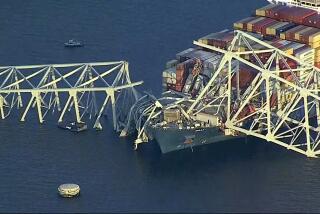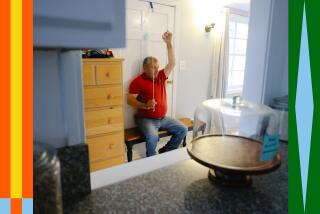Economy Beckons Irish Home
- Share via
DUBLIN, Ireland — Like so many in her generation and most of her siblings, Moyna Noble left Ireland nearly a decade ago in search of opportunities that her country’s chronically depressed economy couldn’t offer.
After finishing college, Noble worked in London and applied for a U.S. green card, eventually settling in San Francisco, where she and her Irish husband found good jobs and had a son.
But when Noble came home for a visit last Christmas, she was seized by the “Celtic Tiger.” She interviewed for a management job with Xerox’s new European services center on her last day of vacation and in 24 hours had an offer. Three weeks later, she moved back to Dublin.
“When I discovered I was able to come home to an equivalent job to the one I had, with a lot more family support and in a multinational start-up, well, you just can’t let an opportunity like that pass you by,” Noble said.
Her story is hardly unique here. Noble, 33, is one of tens of thousands of Irish men and women who have moved home in the last two years to take part in an economic boom that is transforming Ireland from a nation of emigrants to a magnet for workers and refugees from around the world.
Many of the Irish expatriates are returning with American, Australian and British spouses, while multinational corporations here are recruiting across the European Union to fill job openings. Since Noble took her post as human resources manager in Dublin, she has helped hire 750 people at the Xerox headquarters--nearly half of them foreigners.
At the same time, thousands of refugees and economic immigrants have arrived in Ireland, bringing diversity to a society once so homogenous that not only were its members overwhelmingly white and Roman Catholic, but most were said to share the same blood type.
Today, experts estimate that about 20,000 such immigrants live among the 3.7 million residents of Ireland, most of them in Dublin, the capital. Compared with 39 applications for political asylum in 1992, Ireland now receives between 3,500 and 4,500 petitions a year from African, Asian, Eastern European and other refugees.
Then too, many immigrants--the number is unknown--have made their way into Ireland illegally, often hiding in shipping containers on ferries from France and Britain, to look for work.
“I just got a call from a priest in Clonmel,” said immigration attorney Derek Stewart, spokesman for the independent Irish Refugee Council. “Three Chinese nationals were found sleeping on the floor of a Chinese restaurant. They had no money, no addresses and no English.”
Daily occurrences in Los Angeles perhaps, but these are new experiences for a country that used to think its best view was from the back of a boat headed for other shores.
Ever since the mid-19th century famine that left a million Irish dead and forced at least a million more to emigrate, the stream of people leaving the country has scarcely let up. In the 1980s, Ireland was the poor cousin of the European Union, with a ballooning government debt, unemployment of 17% and a young population with no prospects.
Government Works to Attract Investment
That began to change five years ago with a program of government belt-tightening, a campaign to woo foreign investment with low corporate taxes and an influx of development aid from wealthier members of the European Union to promote economic equalization and a common currency. At the same time, the government pushed its youth to take advantage of a free university education.
Today, Ireland’s own shores look good to its sons and daughters. Dublin’s skyline is striped with cranes erecting office buildings. Georgian townhouses that were boarded up just a few years ago have been turned into trendy restaurants and luxury hotels. (“Thirty-eight new hotels opened in Dublin last year, and you still can’t get a room,” noted Finn Gallen of Ireland’s Industrial Development Agency.)
Nearly 45,000 immigrants arrived in Ireland last year, more than half of them Irish. While many young Irish still seek adventure and experience abroad, 50,000 immigrants are expected to have come to Ireland by the end of 1999, again half of them returnees.
Unfortunately, the difficulties and discrimination that Irish immigrants historically experienced in countries such as the United States has not led to a greater tolerance at home.
“We have learned absolutely nothing from that experience,” said Fintan O’Toole, 41, an Irish journalist. “There is relatively little sense of shame about being hostile to immigrants.”
Although most new immigrants are well-educated and employed, public perception is that they are poor, because the needy are the most visible.
Abuse tends to be verbal rather than overtly violent. Black people complain that they are regarded as criminals unless they dress in expensive suits, and Cubans hear shouts of “Bosnian, go home” from Irish children who cannot distinguish one immigrant from another. Foreigners are sometimes barred from neighborhood pubs.
“We’re not xenophobic, just a bit racist,” former Prime Minister Garret FitzGerald explained wryly.
Much of the anger directed at refugees comes from poorer Irish people who fear competition for government assistance and scarce housing, what with prices double and triple those of three years ago.
But many Dubliners, particularly those who have experienced cities such as San Francisco, embrace the diversity. They say they enjoy the Indian restaurants, salsa music and melange of foreign languages that immigrants have brought their city.
These changes, along with a new and seemingly contagious sense of self-confidence among the Irish, make returnees feel as if they are having their cake and eating it. They have found work, fun and the comfort of home.
“Dublin has a more international flavor, with restaurants, places to go, different types of people and cultures,” said Nuala King, who returned from Hong Kong last year after 13 years abroad and also found a management job at Xerox.
“But it has kept its uniqueness. You still find the warmth. Working with a lot of Irish people here, it’s so easy. There’s no pretense. You do what you do best, get on with life and have a laugh at the end of the day,” she said. “It is less intense and competitive than a place like Hong Kong.”
Like many who have returned, King, 35, said she had wanted to move to Dublin for quite a while to be near family and old friends, put down roots and raise her daughter as Irish. She resisted, though, because “I didn’t think Ireland would ever have that much to offer,” she said.
But the economic expansion brought with it expanded opportunities. Today, Ireland is the European headquarters for multinationals such as IBM, Microsoft and scores of other companies taking advantage of its highly educated and English-speaking work force. It is enjoying double-digit annual economic growth without high inflation, thanks to wage-restraint agreements with many unions. Unemployment has dropped below 6%, with 70,000 new jobs created last year and an additional 95,000 expected by the end of 1999.
Immigrants and new entrants into the work force--women and graduating students--have helped fill the demand for labor, although the government has begun recruiting throughout Europe for skilled and semiskilled laborers, especially for the building trades.
Fifty thousand housing units will be built this year. But the construction boom means the average Dubliner is hard-pressed to find a plumber or electrician; bricklayers are scarce and command about $1.50 a brick--$750 a day for a dynamo.
Foreigners Staff Restaurants, Hotels
As in London, hotels and restaurants are staffed by young French, Spanish and Italian workers looking to improve their English. Not enough Irish want the unskilled jobs.
And some of the smaller high-tech companies complain that they cannot compete with the salaries and benefits offered by corporate giants.
“There is pretty much full employment for technical people,” said Barry McCleary, technical director of the biotech company Megazyme. “We have had staff poached. Head-hunted is the nice word.”
McCleary, an Australian, and his Irish-born wife moved their company from Sydney to the Bray Business Park outside Dublin in 1997. She wanted to raise the children in Ireland; he wanted to take advantage of the 10% corporate tax rate--less than a third of Australia’s.
“We couldn’t have had a factory as nice as this one in Sydney, because we couldn’t get past the taxes,” McCleary said. His business has grown by 20% to 30% a year since relocating, largely because it has ready access to the European market. He figures that many firms didn’t like doing business with a faraway company in Australia.
Philip Flynn, managing director of the Seattle-based Visio software company, moved back to Dublin in 1997 to oversee the expansion of his firm’s international headquarters.
“I was aware of what was happening back home, and I wanted to be part of it. I wanted to take the experience I had gotten abroad and bring it back here,” said Flynn, 47. “If before there were bad options in Dublin, now I could say with a degree of certainty that if this didn’t work out [at Visio], there would be something else down the road.”
It has worked out. Visio in Dublin has grown from 65 employees in 1997 to 200 now and is moving into its own building with space to grow to 400. Flynn is happy, and so is his family.
But Flynn, like many successful Dubliners, expresses reservations about the economic boom that is hastening the pace of life in Ireland and creating a growing gap between rich and poor. Suicides are up, and the country’s prison population is rising. Not everyone is sharing in the new wealth. And there is fear of loss amid the gains.
“There is a concern that we don’t become too avaricious and [that we] retain the qualities that made Ireland so attractive: our easygoing nature, our sense of being able to give time to people,” Flynn said.
“The trick is to get the balance right. There are time pressures, pressures because you’ve got the mortgage,” he said. “There is an old Irish word, meitheal, which describes the way people helped each other at harvest time. There is a danger we will become too individualistic.”
For now, however, the prevailing mood is not of worry but of contentment. Most people know the economic good times can’t last forever, but they expect a “soft landing” rather than an Asian-style crash.
“I don’t believe that the economy is going to take a sharp downturn,” said Noble, the Xerox human resources manager. “The labor market in Ireland has a certain skill level now, so that it is always going to be an attractive country. We may have peaks and troughs over the next 50 years, but I don’t believe it will ever be so horrifically low again.”
Noble is so convinced that she is giving up her green card. “My commitment is to Ireland,” she said.
More to Read
Inside the business of entertainment
The Wide Shot brings you news, analysis and insights on everything from streaming wars to production — and what it all means for the future.
You may occasionally receive promotional content from the Los Angeles Times.










